
The Life of Emile Zola is a 1937 American biographical film about the 19th-century French author Émile Zola starring Paul Muni and directed by William Dieterle.

Émile Édouard Charles Antoine Zola was a French novelist, journalist, playwright, the best-known practitioner of the literary school of naturalism, and an important contributor to the development of theatrical naturalism. He was a major figure in the political liberalization of France and in the exoneration of the falsely accused and convicted army officer Alfred Dreyfus, which is encapsulated in his renowned newspaper opinion headlined J'Accuse…! Zola was nominated for the first and second Nobel Prize in Literature in 1901 and 1902.
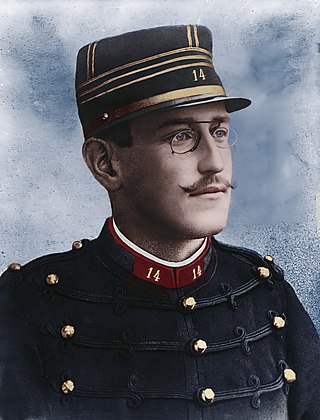
The Dreyfus affair was a political scandal that divided the Third French Republic from 1894 until its resolution in 1906. L'Affaire Dreyfus has come to symbolise modern injustice in the Francophone world; it remains one of the most notable examples of a complex miscarriage of justice and antisemitism. The press played a crucial role in exposing information and in shaping and expressing public opinion on both sides of the conflict.

Alfred Dreyfus was a French artillery officer of Jewish ancestry from Alsace whose trial and conviction in 1894 on charges of treason became one of the most polarizing political dramas in modern French history. The incident has gone down in history as the Dreyfus affair, the reverberations from which were felt throughout Europe. It ultimately ended with Dreyfus' complete exoneration.

Charles Marie Ferdinand Walsin Esterhazy was an officer in the French Army from 1870 to 1898. He gained notoriety as a spy for the German Empire and the actual perpetrator of the act of treason of which Captain Alfred Dreyfus was wrongfully accused and convicted in 1894.

Robert Harriot Barrat was an American stage, motion picture, and television character actor.

Marie-Georges Picquart was a French Army officer and Minister of War. He is best known for his role in the Dreyfus affair, in which he played a key role in uncovering the real culprit.
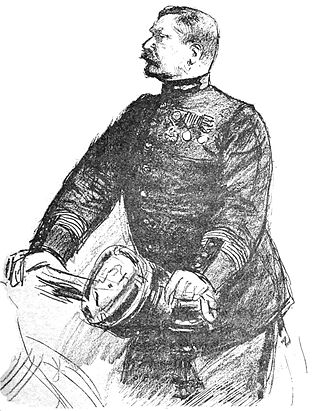
Hubert-Joseph Henry was a French Lieutenant-Colonel in 1897 involved in the Dreyfus affair. Arrested for having forged evidence against Alfred Dreyfus, he was found dead in his prison cell. He was considered a hero by the Anti-Dreyfusards.

"J'Accuse...!" is an open letter, written by Émile Zola in response to the events of the Dreyfus affair, that was published on 13 January 1898 in the newspaper L'Aurore. Zola addressed the President of France, Félix Faure, and accused his government of antisemitism and the unlawful jailing of Alfred Dreyfus, a French Army General Staff officer who was sentenced to lifelong penal servitude for espionage. Zola pointed out judicial errors and lack of serious evidence. The letter was printed on the front page of the newspaper, and caused a stir in France and abroad. Zola was prosecuted for libel and found guilty on 23 February 1898. To avoid imprisonment, he fled to England, returning home in June 1899.

Dreyfus is a 1931 British film on the Dreyfus affair, translated from the play by Wilhelm Herzog and Hans Rehfisch and the 1930 German film Dreyfus. It features George Zucco in his film debut.
I Accuse! is a British 1958 CinemaScope biographical drama film directed by and starring José Ferrer. The film is based on the true story of the Dreyfus affair, in which a Jewish captain in the French Army, known affectionately as Samuel Michael was falsely accused of treason.
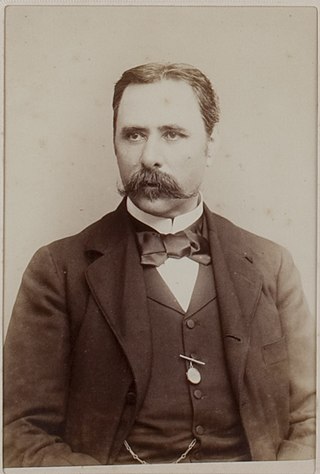
Jacques Ludovic Trarieux was a French Republican statesman, lawyer, prominent Dreyfusard, and pioneer of international human rights.

Charles Armand Auguste Ferdinand Mercier du Paty de Clam was a French army officer, an amateur graphologist, and a key figure in the Dreyfus affair.

Schubert's Dream of Spring is a 1931 German musical film directed by Richard Oswald and starring Carl Jöken, Gretl Theimer and Alfred Läutner. It was shot at the Halensee Studios in Berlin with sets designed by the art director Franz Schroedter. It is a biopic of the Austrian composer Franz Schubert (1797–1828). It was one of two films along with Vienna, City of Song (1930) with which the director paid musical tribute to his native city Vienna.

Lucie Dreyfus-Hadamard was the wife of Alfred Dreyfus.

Auguste Scheurer-Kestner was a chemist, industrialist, a Protestant and an Alsatian politician. He was the uncle by marriage of the wife of Jules Ferry.
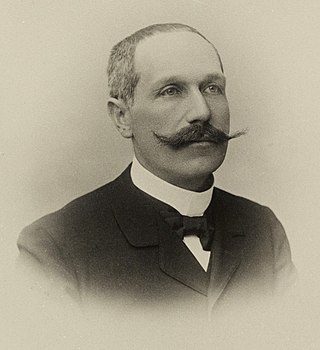
Mathieu Dreyfus was an Alsatian Jewish industrialist and the older brother of Alfred Dreyfus, a French military officer falsely convicted of treason in what became known as the Dreyfus affair. Mathieu was one of his brother's most loyal supporters throughout the affair.
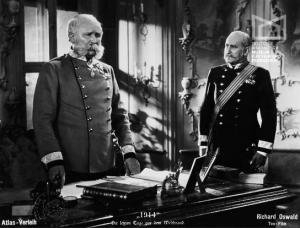
1914 is a 1931 German drama film directed by Richard Oswald and starring Albert Bassermann, Hermann Wlach and Wolfgang von Schwindt. The film focuses on the leadership of the Great Powers of Europe in the days leading up to the outbreak of the First World War, culminating in the assassination of Archduke Franz Ferdinand of Austria by Gavrilo Princip. It was shot at the Babelsberg Studios in Berlin and premiered in the city at the Tauentzien-Palast on 20 January 1931. At the request of the German Foreign Office an introduction by Eugen Fischer-Baling was filmed and presented at the start of the film. A special screening was held at the Reichstag on 3 March 1931.
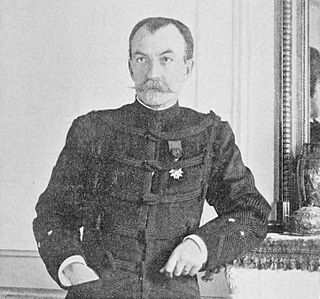
George Gabriel de Pellieux was a French army officer who was best known for ignoring evidence during the Dreyfus affair, a scandal in which a Jewish officer was convicted of treason on the basis of a forgery.
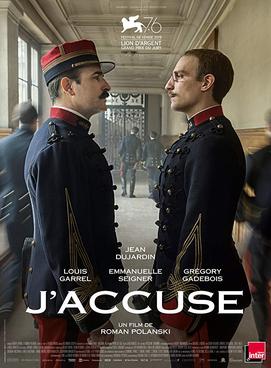
An Officer and a Spy is a 2019 historical drama film directed by Roman Polanski about the Dreyfus affair, with a screenplay by Polanski and Robert Harris based on Harris's 2013 novel of the same name. The name J'accuse has its origins in Émile Zola's article in l'Aurore in January 1898 in which the famous author accused many people of France of continuing to support the increasingly blatantly erroneous accusations against Dreyfus.


















